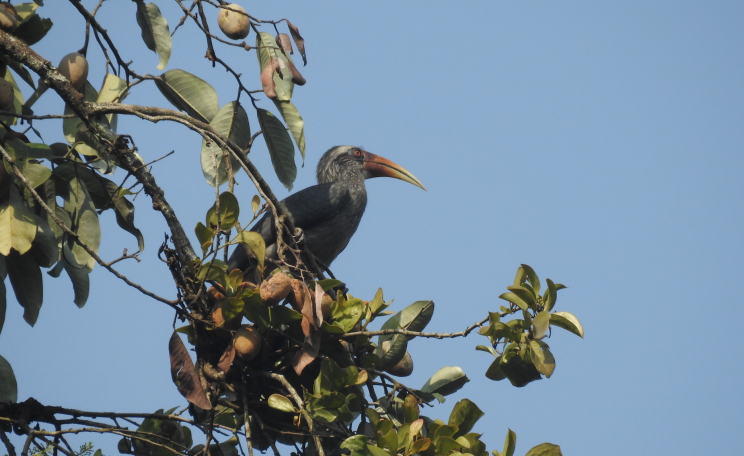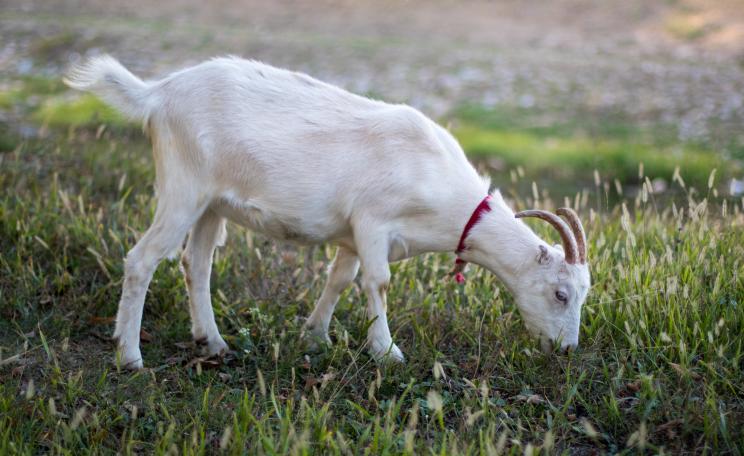-
Thich Nhat Hanh (known as Thầy) first came to my attention when he was nominated for a Nobel Peace Prize, in recognition of his huge efforts to end the Vietnam war.
His nomination was famously sponsored by Martin Luther King, in 1967. King said: "I do not personally know of anyone more worthy of [this prize] than this gentle monk from Vietnam. His ideas for peace, if applied, would build a monument to ecumenism, to world brotherhood, to humanity."
Earlier this year I read an article in an Indian newspaper that Thầy was still with us despite his long years. I wanted to introduce him to a new generation of environmentalists.
Personal suffering
Thầy was born in 1926. He is a revered Vietnamese monk, who has hundreds of thousands of followers around the world. Despite being a man of great peace, he predicts “the possible collapse of civilisation within 100 years.”
He is often compared to the Dalai Lama but has largely escaped the public's gaze, deciding to live the life of a simple monk.
Similarly, he has avoided the trap of being surrounded by celebrities and will give interviews only to journalists who have spent time beforehand meditating with him on the basis that mindfulness needs to be experienced, rather than described.
Thầy suffered a stroke in 2014. He can no longer keep the strenuous schedule that had seen him repeatedly criss-crossing the world, leading retreats and passing on his teachings. Travels across the US and Asia are a thing of the past.
Thầy believes that people haven't been able to move beyond their own personal suffering, and that's why many people are not responding to the threat of global warming, despite overwhelming scientific evidence.
No death
In his book No Death, No Fear, Thầy wrote: "The day my mother died I wrote in my journal, 'A serious misfortune of my life has arrived.' I suffered for more than one year after the passing away of my mother. But one night, in the highlands of Vietnam, I was sleeping in the hut in my hermitage. I dreamed of my mother.
"I saw myself sitting with her, and we were having a wonderful talk. She looked young and beautiful, her hair flowing down. It was so pleasant to sit there and talk to her as if she had never died. When I woke up it was about two in the morning, and I felt very strongly that I had never lost my mother.
"The impression that my mother was still with me was very clear. I understood then that the idea of having lost my mother was just an idea. It was obvious in that moment that my mother is always alive in me.
"I knew this body was not mine but a living continuation of my mother and my father and my grandparents and great-grandparents. Of all my ancestors. Those feet that I saw as "my" feet were actually "our" feet."
Elsewhere he has said: "It is very clear that ‘Thầy’ will not die but will continue in other people. So there is nothing lost and we are happy because we are able to help the deeply misunderstood Buddha to renew his teaching"
Peaceful solutions
He continues: "I have died already many times and you die every moment and you are reborn in every moment so that is the way we train ourselves.
"It is like the tea. When you pour the hot water in the tea, you drink it for the first time, and then you pour again some hot water and you drink, and after that the tea leaves are there in the pot but the flavour has gone into the tea and if you say they die it is not correct because they continue to live on in the tea, so this body is just a residue.
"It still can provide some tea flavour but one day there will be no tea flavour left and that is not death. And even the tea leaves, you can put them in the flower pot and they continue to serve so we have to look at birth and death like that.
"So when I see young monastics and lay people practicing, I see that is the continuation of the Buddha, my continuation."
Thầy has continued to work for peaceful solutions to conflicts around the world, including holding several retreats for Israelis and Palestinians.
Meditation
He has said: "The happiest moments are when we sit down and we feel the presence of our brothers and sisters, lay and monastic, who are practicing walking and sitting mediation. That is the main achievement and other things like publishing books; setting up institutions like in Germany, they are not important.”
"It is important we have a sangha [community] and the insight came that the Buddha of our time may not be an individual but it might be a sangha.
"If every day you practice walking and sitting meditation and generate the energy of mindfulness and concentration and peace, you are a cell in the body of the new Buddha. This is not a dream but is possible today and tomorrow. The Buddha is not something far away but in the here and in the now."
A few years ago, prompted by a letter that informed him that someone had built a temple in Hanoi to commemorate his life, Thầy sent a letter to the Tu Hieu temple in central Vietnam, where he trained as a novice monk, making it clear he does not want a shrine built in his honour when he dies.
He said: "I said don't waste the land of the temple in order to build me a stupha. Do not put me in a small pot and put me in there. I don't want to continue like that. It is better to put the ash outside to help the trees to grow. That is a meditation."
Ethical roadmap
He added: "I recommend that they make the inscription outside on the front 'I am not in here'. And then if people do not understand, you add a second sentence 'I am not out there either' and if still they don't understand on the third and the last: 'I may be found maybe in your way of breathing or walking.'
In his book Fear, Thầy writes about how people spend much of their lives worrying about getting ill, ageing and losing the things they treasure most, despite the obvious fact that one day they will have to let them all go.
Thầy suggests that our search for fame, wealth, power and sexual gratification provides the perfect refuge for people to hide from the truth about the many challenges facing the world.
Worse still, our addiction to material goods and a hectic lifestyle provides only a temporary plaster for gaping emotional and spiritual wounds, which only drives greater loneliness and unhappiness.
Thầy created the Engaged Buddhism movement, which promotes the individual's active role in creating change, and his mindfulness training – an ethical roadmap – calls on practitioners to boycott products that damage the environment and to confront social injustice.
Awakened consumers
Given the difficulty of convincing those with vested interests to change their behaviour, Thầy says a grassroots movement is necessary, citing the tactics used by Gandhi, but insists that this can be effective only if activists first deal with their own anger and fears, rather than projecting them onto those they see at fault.
Awakened consumers can influence how companies act.
On companies that produce harmful products, he said: "They should not continue to produce these things. We don't need them. We need other kinds of products that help us to be healthier.
"If there is awakening in the ranks of consumers, then the producer will have to change. We can force him to change by not buying.
Thầy invokes Gandhi’s wisdom: "Gandhi was capable of urging his people to boycott a number of things. He knew how to take care of himself during non-violent operations. He knew how to preserve energy because the struggle is long, so spiritual practice is very much needed in an attempt to help change society."
Cultivate compassion
Thầy, the author of more than 100 books including the best-selling Miracle of Mindfulness, says that while it is difficult for those holding the strings of power to speak out against the destructive nature of the current economic system, for fear of being ostracised and ridiculed, we do need more leaders to have the courage to challenge the status quo.
For business and political leaders to do that, they need to cultivate compassion in order to embrace and diminish their ego. Does it strike us as ironic how those who are most pro-war - Trump, Bush, Blair and the rest- are almost always people who never had to fight in one. The same people do not believe in the threat of climate change.
Thầy said: “You have the courage to do it [speak out] because you have compassion, because compassion is a powerful energy. With compassion you can die for other people, like the mother who can die for her child.
You have the courage to say it because you are not afraid of losing anything, because you know that understanding and love is the foundation of happiness. But if you have fear of losing your status, your position, you will not have the courage to do it."
Thầy states that true happiness can be found by touching the sacred in the very ordinary experiences of life, which we largely overlook.
Continue learning
Despite meditating every day for the past seven decades, Thầy believes there is still much to learn. "In Buddhism we speak of love as something limitless.” Thầy says Buddha thinks like that.
"There is no limit of the practice. And I think that is true of the human race. We can continue to learn generation after generation and now is time to begin to learn how to love in a non-discriminatory way because we are intelligent enough, but we are not loving enough as a species."
This Author
Richard Galustian has lived and worked most of the past 40 years in the Middle East and North Africa. He is a regular columnist with Gulf News in Dubai, Times of Malta, Oman Times, The Duran, the Ron Paul Institute, as well as having contributed articles to various other British and American publications including London's The Spectator, the Washington Examiner and CNN.
Image: Martin Luther King and Thich Nhat Hanh. Thich Nhat Hanh Foundation.




